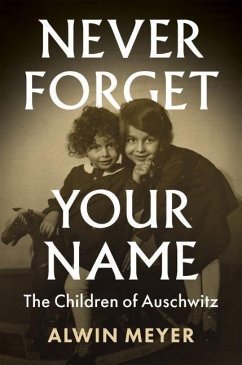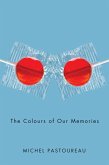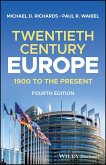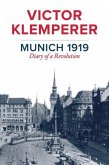The children of Auschwitz: this is the darkest spot in the ocean of suffering that was the Holocaust. They were deported to the concentration camp with their families, with most being murdered in the gas chambers upon their arrival, or were born there under unimaginable circumstances. While 232,000 children and juveniles were deported to Auschwitz, only 750 were liberated in the death camp at the end of January 1945. Most of them were under 15 years of age. Alwin Meyer's masterwork is the culmination of decades of research and interviews with the children and their descendants, sensitively reconstructing their stories before, during and after Auschwitz.
The camp would remain with them throughout their lives: on their forearms, as a tattooed number, and in their minds, in the memory of heart-rending separation from parents and siblings, medical experiments, abject confusion, ceaseless hunger and a perpetual longing for home and security. Once the purported liberation came,there was no blueprint for piecing together personal biographies after the unthinkable had happened. Many of the children, often orphaned, had forgotten their names or ages, and had only fragmented understandings of where they came from. While some struggled to reconnect to the parents from whom they had been separated, others had known nothing other than the camp. Some children grew up without the ability to trust and to play. Survival is not yet life - it is an in-between stage which requires individuals to learn how to live. The liberated children had to learn how to be young again in order to grow into adults like others did.
This remarkable book tells the stories of the most vulnerable victims of the Nazis' systematic attempt to extinguish innocent lives, and rescues their voices from historical oblivion. It is a unique testimony to the horrific suffering endured by millions in humanity's darkest hour.
Hinweis: Dieser Artikel kann nur an eine deutsche Lieferadresse ausgeliefert werden.
The camp would remain with them throughout their lives: on their forearms, as a tattooed number, and in their minds, in the memory of heart-rending separation from parents and siblings, medical experiments, abject confusion, ceaseless hunger and a perpetual longing for home and security. Once the purported liberation came,there was no blueprint for piecing together personal biographies after the unthinkable had happened. Many of the children, often orphaned, had forgotten their names or ages, and had only fragmented understandings of where they came from. While some struggled to reconnect to the parents from whom they had been separated, others had known nothing other than the camp. Some children grew up without the ability to trust and to play. Survival is not yet life - it is an in-between stage which requires individuals to learn how to live. The liberated children had to learn how to be young again in order to grow into adults like others did.
This remarkable book tells the stories of the most vulnerable victims of the Nazis' systematic attempt to extinguish innocent lives, and rescues their voices from historical oblivion. It is a unique testimony to the horrific suffering endured by millions in humanity's darkest hour.
Hinweis: Dieser Artikel kann nur an eine deutsche Lieferadresse ausgeliefert werden.
'Shattering... When you're writing about Auschwitz, where one million people were murdered, it's easy for everything to become a blur of numbers. But Meyer turns the statistics back into stories: telling us where the children came from, how they survived, and what happened to them after the war.'
Daily Telegraph
'An important book at a crucial time.'
San Antonio Review of Books
'In a list reminiscent of Schindler's, every name in the index corresponds to a tale of torture, suffering and loss. Opening the book randomly takes courage, as the risk is to possibly be confronted with paragraphs detailing the murder of newborns by willing nurses, or mothers kicked to death by guards. Only the photos of the surviving children allow the reader time to breathe, although Alwin found there were always moments of hope - even in Auschwitz.'
Jewish News
'This is a compelling book, magnificently researched and fluently written. The testimony of child survivors, on which the book heavily draws, is heart-rending; the sense of loss, and of being lost, that it conveys is haunting. The extraordinary range of primary documentation is matched by the swift passage of many stories, which makes this book an absorbing read - eloquent, powerful and abounding with humanity.'
Monica Tempian, Victoria University of Wellington
"Reading this book and using other books like it as teaching tools is critical, particularly in our current climate of racism and bigotry. If we are to grow together into a peaceful future, we must first identify the dangers of the past and be certain not to repeat them. This book is a great first step."
New York Journal of Books
"Meyer has painstakingly detailed these stories as a labor of love so that every Jewish child born in, or survivor of, Auschwitz has a voice. This is their legacy."
H-Net Reviews
Daily Telegraph
'An important book at a crucial time.'
San Antonio Review of Books
'In a list reminiscent of Schindler's, every name in the index corresponds to a tale of torture, suffering and loss. Opening the book randomly takes courage, as the risk is to possibly be confronted with paragraphs detailing the murder of newborns by willing nurses, or mothers kicked to death by guards. Only the photos of the surviving children allow the reader time to breathe, although Alwin found there were always moments of hope - even in Auschwitz.'
Jewish News
'This is a compelling book, magnificently researched and fluently written. The testimony of child survivors, on which the book heavily draws, is heart-rending; the sense of loss, and of being lost, that it conveys is haunting. The extraordinary range of primary documentation is matched by the swift passage of many stories, which makes this book an absorbing read - eloquent, powerful and abounding with humanity.'
Monica Tempian, Victoria University of Wellington
"Reading this book and using other books like it as teaching tools is critical, particularly in our current climate of racism and bigotry. If we are to grow together into a peaceful future, we must first identify the dangers of the past and be certain not to repeat them. This book is a great first step."
New York Journal of Books
"Meyer has painstakingly detailed these stories as a labor of love so that every Jewish child born in, or survivor of, Auschwitz has a voice. This is their legacy."
H-Net Reviews








